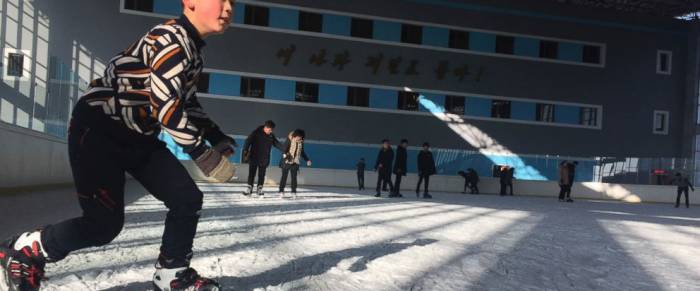The U.S. president, its state media claim, is waging a cynical campaign to keep the rival Koreas apart and speeding up preparations for a nuclear war. And those conservatives in South Korea, it says, need to show more respect, or North Korea may just have to rethink its proposed participation altogether.
North Korea is certainly no stranger to the art of the bluff. Diatribes against enemies perceived and real are a staple of its messages to the outside world and a complete withdrawal from the Olympics would seem unlikely at this late stage. But its tone has been particularly schizophrenic since leader Kim Jong Un suggested sending a delegation to the games in his New Year’s Day address.
Could more surprises lie ahead?
Here’s a look at the hand North Korea is trying to play as the Olympics near.
BEHIND THE OLIVE BRANCH
North Korea has a lot to gain by participating in the Olympics.
It’s clearly hoping to get a much-needed breather after a year of intense political and military tensions. It has already scored one victory — massive annual joint U.S.-South Korean military exercises that it believes are a dress-rehearsal for an invasion have been postponed until after the games are over. North Korea is now demanding the maneuvers, which regularly lead to heightened tensions as both sides rev their militaries up to maximum readiness, be called off permanently.
HOT HEADS, COLD FEET?
Almost as soon as Kim suggested sending a delegation to the Olympics, North Korea’s media turned up its anti-Trump, anti-U.S. rhetoric.
Of course, it’s no big surprise to find anti-U.S. rhetoric in the North Korean media. But the North is unusually concerned about what Trump’s next moves might be and whether he is seriously considering a military option.
That concern has been pretty clear from its now almost-daily diatribes against Washington’s deployments of two and possibly three aircraft carriers and their battle groups to the region and the positioning of strategic bombers on the Pacific island of Guam.
“The U.S. is bringing dark clouds of a nuclear war to the peninsula over which doves should fly, revealing that it is the heinous enemy of peace and a war maniac which should not exist on the Earth,” said a typical commentary Thursday in the ruling party newspaper.
Reading between the lines, one likely motivation for the heightened verbal campaign is to tell Washington it will not let down its guard during the games. Another motive is to try to gain sympathy in Seoul — along with Beijing and Moscow — for the argument that the U.S., not North Korea, is the threat to peace and stability in the region.
Not all South Koreans, meanwhile, are happy about North Korea’s Olympic overtures.
Large-scale protests, especially if they involve burning Kim in effigy, could be a deal-breaker for North Korea. Its barrages against anti-North elements in the South began in earnest after that very thing happened during a visit of one of its advance teams to Seoul.
If a similar incident were to occur again, the North has suggested it may pull out and go home.
CONTROLLING THE MESSAGE
South Korea is the Olympic host, but North Korea may get the opening spotlight.
Not long after Kim made the Olympic offer, the North announced it will hold a major military event in Pyongyang, its capital, on Feb. 8, the day before the games begin. Officials refuse to confirm details, but it will likely be a mass rally and military parade. What kind of weaponry it will put on display remains a secret, but such events are scrutinized closely by military experts and are guaranteed to receive big media coverage around the world.
To further control what the world sees, North Korea appears to have considered but then decided to deny access to journalists and photographers who are not based in the North.
It isn’t clear how much of the Olympics North Koreans will be able to see. Live broadcasts are unlikely and only a trickle of information about the country’s athletes and delegates to South Korea has been reported so far. Repeated requests by The Associated Press to interview athletes, officials or any members of the delegation were refused.
Athletes from North Korea have been increasingly competing abroad since Kim Jong Un assumed power in late 2011 and defections are unheard of.
But with several hundred people expected to go to the Olympics — including an orchestra, singers, dancers, a taekwondo demonstration team and an all-female cheering group — North Korea will be hard-pressed to avoid the “ideological contamination” that might result from too much exposure to the South’s affluence and social freedoms.
Judging by past precedent, they can all expect to be kept on a very short leash.
The Washington Post
More about: NorthKorea WinterOlympics
















































